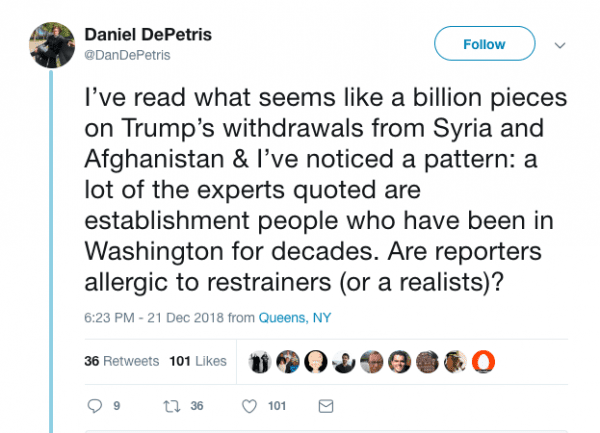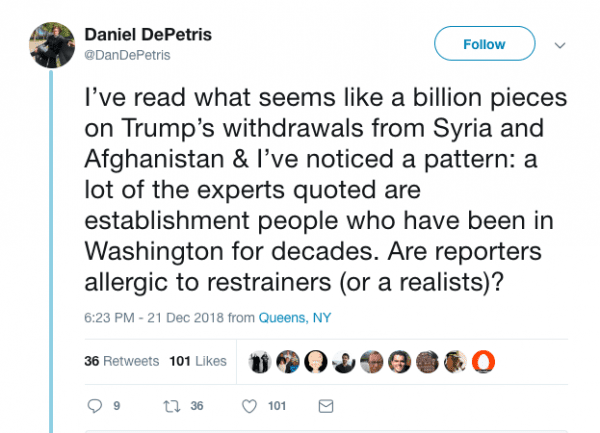‘Losing’ Syria

Fifth, many observers have been quick to see the redeployment as a loss for the United States and a big win for Russia, Iran, Hezbollah, Turkey, or whomever, and to assume that some or all of these actors will quickly consolidate a lot of valuable influence in Syria. Maybe so, but Syria isn’t much of a prize at this point and may even be something of a liability. It was always a weak state, and its economy and infrastructure have been severely damaged by a punishing civil war. Instead of being a major strategic asset, Syria is more likely to turn into a costly quagmire for the supposed victors. The area remains a cauldron of competing political forces, and as the political scientist Mark Katz points out, their competing interests are likely to come to the fore once the United States withdraws. If so, then handing the Syrian quagmire off to others could be a net win for the United States.
More:
Instead of obsessing about who is supposedly “winning” and who is supposedly “losing,” the United States should start by identifying its core strategic interests. When it comes to the Middle East, its main strategic interest is helping ensure that Middle East oil and gas continues to flow to world markets. (The United States gets very little energy from the region these days, but a sudden cutoff would damage the world economy and thus harm America as well.) This goal does not require the United States to control the region or dictate local political arrangements, however; it merely means helping prevent any other state from taking over the region. Fortunately, the region is as divided today as it has ever been, and the danger that any state (including Iran, Russia, China, or anyone else) will take over is vanishingly small. If that is the case, then staying in Syria contributes little to U.S. security or prosperity.
Read the whole thing. Walt says the only thing that troubles him about it is the abandonment of the Kurds. But, he says, the US cannot have an open-ended commitment to the Kurds, who in any case were not fighting for America, but out of their own self-interest. By the way, Walt makes a very interesting point about how absurd it is to say that the US “lost” Syria. Syria has for decades been a Russian client state. We have had nothing to do with it.
Here’s a great question about media coverage of the policy shift:

More:

Yes, and The American Conservative, which was founded in opposition to Mideast meddling. If you haven’t read Matt Purple’s piece on official Washington’s freakout over the Trump withdrawal, you really should. Excerpt:
We’ve heard a lot this week about the capital we’re sacrificing by pulling out of Syria: in power, in allies, in something called “credibility” that hawks seem to think functions like Monopoly money. But what about those two resources I just mentioned: dollars and lives? Why do those get so little attention? The United States since 2001 has spent nearly $6 trillion on wars in the Middle East, according to Brown University’s Watson Institute of International and Public Affairs. In Syria, that money has often gone towards gilded banana peels that we then promptly trip over, including two plans to arm rebels that ended up feeding weapons to jihadists and a $500 million program to train fighters that produced about five graduates before being shut down. Meanwhile, America’s infrastructure crumbles. Why shifting money into domestic needs at times such as this is considered “populist” rather than just commonsense, I will never understand.
Subscribe for as little as $5/mo to start commenting on Rod’s blog.